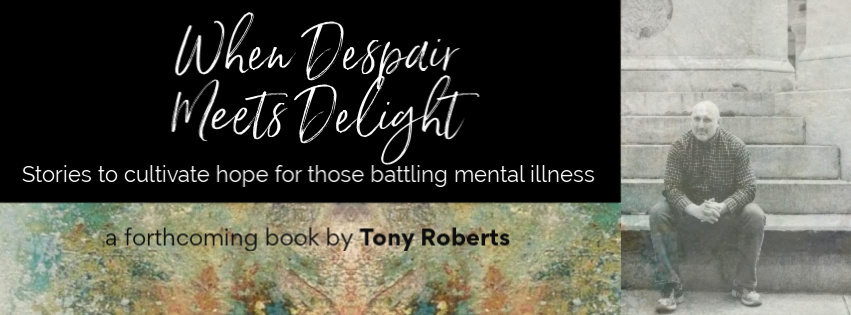As I approach the Eleventh hour toward submitting my book for publication, I am calling everything into question. The other night I recorded an audio version and found 33 changes I wanted to make. Then, my mind turned to the title.
When Despair Meets Delight: Stories to cultivate hope for those with serious mental illness.
Does this best describe my mission and communicate my message? I had some doubts. Not about it all. It was just not quite right. And the part that wasn’t right was SERIOUS!
What is a serious mental illness (SMI). I first found the term on the National Institute for Mental Health (NIMH) website. While the definition has been in flux of late, SMI tends to refer to those diagnoses which are typically most debilitating, such as schizophrenia, bipolar disorder, or major depression. But this is a very subjective scale and even the “experts” disagree on how to apply it.
So I turned to my Facebook community, Hope for Troubled Minds, and I asked this question:
What is the difference between a mental health issue and a serious mental illness (SMI)?
The question sparked 43 lively comments, including these:
Laura Kaponer : Struggling is struggling. Pain is pain. I think SMI is a term that divides the mentally ill community. So many of us have the same challenges: medication meri-go-round, multiple hospitalizations, both external and internal stigma and discovering the most effective symptom management strategies.
Jolie Buchanan: If we want to break through stigma, I feel we need to lose the SMI word. The only reason I can see that we need it is potentially for policy reasons as it relates to healthcare decisions/payments – otherwise it divides too much. It also seems like a buzz word organizations and advocates overuse when many times they do not mean what they are saying. Even in my graduate work to be a mental health practitioner, this word is not used.
Ken Corbin SMI is a progressive disease for the most part and it is very emotionally painful for a family and person to deal with. It requires a lot of love, acceptance and patience. It is the person trapped within their brain trying to express themselves and nothing comes out yet they are aware of life around them.
It was great to get such thoughtful responses. They prompted me to wonder if there is a flaw in the language of “SMI”. So, I asked a follow up question —
How do we promote mental health while, at the same time, improve treatment for those with brain disorders, such as schizophrenia, bipolar, and major depression?
Leslie Carpenter: I think the answer is to work on increasing services all along the continuum of care from inpatient hospital beds to long term supports in the community, with quality supports and measures in place to prevent abuses and atrocities as well. I think it benefits every single person, with or without a brain disorder or a serious brain disorder for us to have more quality care available for everyone who needs medical treatment and community support including long term supportive housing for those who truly need that. I also think it includes engaging with people from diverse backgrounds and perspectives, openly and respectfully, to understand each other and learn from each other.
Michael Turner I think we need more care for all. Period. Some need step down care after a hospitalization in which they finally feel capable of being totally on their own if possible or desired by them. For those who have a crisis need to get enough care after including step down units, have places that one can go to get help after or before a crisis. We also need to make sure our communities have enough resources, groups, professionals to help all especially those with SMIs.
Lisa Wenninger Start young and teach true coping skills that can help maintain mental health. Funding for research for the advancement of mental illness understanding and care, perhaps meds that aren’t as abrasive as what is available today, therapy, counseling, and resources.
Taking these comments into consideration, I asked myself again — Who is my target audience? & What do I want them to know? These are questions every good writer asks him/herself before beginning a project, but it’s important to always come back to it. As I revisited these questions, I concluded that —
My audience is those impacted by mental illness, regardless of severity. My own mental illness fits the category deemed SMI but this designation is divisive and archaic. I want to address readers who face mental health issues themselves or in those they know and love. Some of these may be dealing with SMI/brain disorders, and others are not. My book is not a medical text meant for treatment, it is one designed to uplift and encourage.
This is my primary offering to my readers — stories of hope from my own life and from my ministry. Battling bipolar and working with others who strive to survive other mental health challenges can seem all-consuming at times. As one of my faithful readers put it — the whole reason people would turn to my book would be to find hope.
So, just before we press the submit button for the printer, my book is now officially —
When Despair Meets Delight: Stories to cultivate hope for those battling mental illness.
Is this a title you can connect to, one you would buy?







